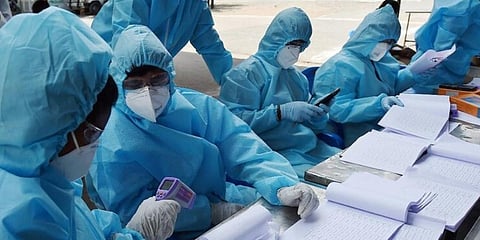

NEW DELHI: The government on Friday said 25 cases of the Omicron variant of coronavirus have been detected in India so far and that mild symptoms have been noted in all the cases. It also stated that clinically, Omicron is not posing a burden on the healthcare system yet, but the vigil has to be maintained.
At a press conference, Joint Secretary (Health) Lav Agarwal said that 96 international passengers have tested COVID-19 positive since December 1 and 83 of them were from 'at-risk' countries.
Genomic sequencing is being carried out for these 96 COVID-19 positive samples, he said, adding 59 countries have reported cases of the Omicron variant so far.
About cases of the new variant of coronavirus in India, Agarwal said, "Twenty-five instances of the Omicron variant have been reported in India. Ten of them are in Maharashtra, nine in Rajasthan, three in Gujarat, two in Karnataka, and one in Delhi."
"Omicron cases detected comprise less 0.04 per cent of the cases of different variants detected. All detected Omicron cases have mild symptoms," Agarwal said. He asked citizens to strictly follow Covid-appropriate behaviour to prevent a surge in COVID-19 cases as being seen in many European countries.
Referring to a recent analysis by World Health Organisation (WHO) which observed that compliance to public health and social measures is declining with an increase in vaccination rate, officials warned about the declining trend of wearing masks.
NITI Aayog member (Health) Dr VK Paul said the usage of masks in the country has declined to pre-second wave levels as he referred to an assessment by the Institute for Health Metrics and Evaluation.
"In a way, we have again entered a danger zone. From the point of view of protection capability, we are now operating at a low level, at a risky and unacceptable level. We have to remember that both vaccines and masks are important," he said.
"We are witnessing clusters of Covid cases in one or two regions. Over 70 such clusters are under our watch. By and large, the Delta variant is responsible for it... Still, we have to be vigilant. Getting both doses of vaccine and wearing masks is important," Paul said.
However, he said there has been no recommendation yet from the National Technical Advisory Group on Immunization (NTAGI) on vaccinating children against COVID-19.
To a question whether the Indian Council of Medical Research (ICMR) is conducting any study on the effectiveness of Covishield and Covaxin against Omicron, its Director-General Dr Balram Bhargava said samples of 25 Omicron cases have been collected at the NIV Pune.
"We are trying to grow the virus. Once we do so, we will be able to test the efficacy of both these vaccines by taking blood from inoculated individuals and see how effective that is in the laboratory," he said.
Asked how long immunity due to vaccination lasts, Bhargava explained that for scientific data on vaccine efficacy, three things are important -- antibody response, cellular immunity and mucosal immunity.
Measuring cellular immunity and mucosal immunity is difficult, costly and time-consuming. It can be measured if antibody response is declining. Data shows that they last for six months to one year and vaccines can be effective depending on the type, he said, adding antibodies vary from individual to individual.
About the cases of the latest variant of coronavirus, Bhargava said, "Clinically, Omicron as is not yet posing a burden on the healthcare system. However, the vigil has to be maintained." Regular meetings are being organised to keep a watch on the global scenario, he said.
"Regular meetings are being held to examine the COVID-19 scene in India with a focus on Omicron and care is being taken," Bhargava said, adding that district-level restrictions are to be implemented where the case positivity rate is more than 5 per cent.
There are only around 25 districts that have a positivity rate of over five per cent. States have to ramp up testing, he said Appropriate and scientific evidence for diagnosis and treatment are being reviewed regularly.
The ICMR director general said that the treatment remains unchanged at the moment. The government said 86.2 per cent of the country's adult population received the first dose of COVID-19 vaccine, while 53.5 per cent has been administered both doses.
It said the weekly positivity rate in 19 districts was between five and 10 per cent and it was over 10 per cent in eight districts of three states. India's coronavirus tally climbed to 3,46,74,744 with the addition of 8,503 infections in a day, while the number of active cases rose to 94,943, according to the Union Health Ministry data updated on Friday.
The death toll mounted to 4,74,735 with the addition of 624 new fatalities, according to the data updated at 8 am. The daily rise in new coronavirus infections has been recorded below 15,000 for the last 43 days now.